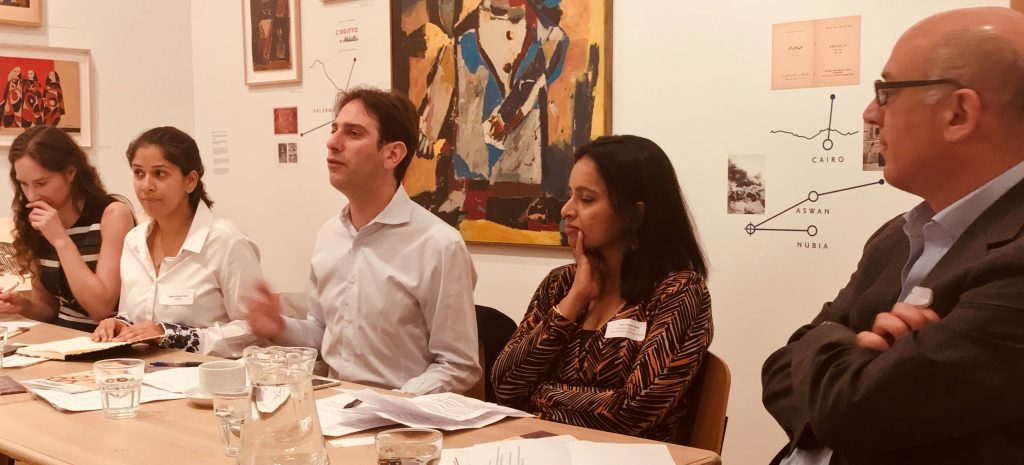Alliance‘s quarterly breakfast panel, hosted for the first time at London’s Mosaic Rooms, included a lively and diverse panel to discuss the magazine’s March 2018 issue, which focuses on diaspora philanthropy and its global role.
More than 40 attendees from international philanthropy, foundations and worldwide development experts gathered to analyse key issues, trends, controversies and content from the March issue’s special feature, which was guest edited by Mark Sidel at the University of Wisconsin-Madison.

Accompanied by Alliance editor Charles Keidan, the predominately female panel featured perspectives from philanthropist Meheen Rangoonwala of The Rangoonwala Foundation as well as Eleanor Harrison, CEO of GlobalGiving UK and Abha Thorat-Shah of the British Asian Trust. The panel also included Omar Al-Qattan, chair of the A M Qattan Foundation, which established the Mosaic Rooms as a cultural hub and contemporary art gallery to promote dialogue with the Arab world.
With expertise and experience in diaspora philanthropy, the panellists offered insights on its global view and focus, asking pressing questions of management and regulation, politics and nationalism, and greater diversity and ecosystem.
Stimulating start to the week. @Alliancemag breakfast on #diasporaphilanthropy – technology, equity, unlearning the modes of western philanthropy, and building trusted links between local & global actors. pic.twitter.com/LVOIOa3R8B
— Thinking Philanthropy (@philanthink) April 23, 2018
Opening the discussion, Eleanor Harrison emphasized how GlobalGiving was contributing to the greater efficiency and transparency of diaspora philanthropy. It also aims to shift the power in philanthropy by placing more money and tools in the hands of local communities to spend effectively. ‘Too much money is held by too few people,’ she noted.
Focusing on three audiences – community-led organisations, donors and other foundations and government – more than 50 per cent of GlobalGiving’s partners are truly local. The NGO prioritises flexible spending and local influence to avoid money becoming ‘too rigid,’ she stressed.
Harrison also encouraged diaspora’s ability to connect with passionate funders, its focus on social, human and financial capital and the need for diaspora to take more risks. She challenged the audience to think about accountability standards and trust in the technology era, which raises issues of equity with the commercialisation of the internet and ecommerce model.
Great final challenge to us all from @EllieJHarrison from @global giving to engage with the realities of tech revolution and understand how it can disrupt and enrich philanthropy practice #diasporaphilanthropy
— Fiona Rawes (@FionaRawes) April 23, 2018
Bringing in the perspective from a family foundation, Meheen Rangoonwala defined diaspora philanthropy in two ways. With her Pakistani heritage, Rangoonwala noted that donating in her country of origin is easier because of her close ties to home – the foundation has significant presence in Pakistan and she has close family living there. However, diaspora is not as easy for everyone because of limited connections to their home country, she noted.
Meheen Rangoonwala of the #Rangoonwala Fdn describes her personal philanthropic journey as someone with 'Pakistani heritage, married to an Indian and feels British – I am the diaspora!' #diasporaphilanthropy
— Alliance magazine (@Alliancemag) April 23, 2018
Rangoonwala noticed trends with diaspora giving in Pakistan. Many people give back through international organisations because of their established trust rather than through local organisations ‘where there’s often some kind of doubt.’
With this gap in diaspora philanthropy, Rangoonwala asked whether people without significant links to home understand the local issues and are donating to the right issues. ‘It should all be locally led,’ Rangoonwala emphasized.
Abha Thorat-Shah noted that the British Asian Trust’s dual identity in diaspora philanthropy. With over three million Asians calling the UK home, there are deep roots to the sub-continent, Thorat-Shah said. The trust was set up to engage British Asian donors to make a positive impact in South Asia.
"Giving is something that makes you a better person" @abhathorat from @britishasiantst at @Alliancemag panel on#diasporaphilanthropy pic.twitter.com/Q2XJiWtxAc
— Richard Hawkes (@R_Hawkes) April 23, 2018
As for diaspora giving, ‘it is true you want to go back and help the place you came from,’ Thorat-Shah highlighted. Networks serve as a powerful tool for bringing communities together and collaborating. She stated that the trust works collectively with local philanthropists and local means, offering solutions, as opposed to restating problems.
When it comes to diaspora philanthropy, Al-Qattan reflected on his interview in the March issue. He emphasized the importance of avoiding nationalistic and communitarian thinking – the charitable sector is a public sector after all. He also noted that while the first generation has strong, emotional roots to its country of origin, the second generation can have an ambiguous relationship to its host country and is less understanding of its culture.
Al-Qattan examined the Arab region’s issues in philanthropy and its evolving role. He discussed the complications of the region’s political matters, as well as being identified with their Muslim faith. Al-Qattan noted Tony Blair’s reference to the UK’s Arabs as ‘British Muslims’, as opposed to identifying them with their ethnic heritage.
Insight from @OAQattan @QattanFDN "to be identified with your faith is quite a worrying trend" — part of today's @Alliancemag #diasporaphilanthropy discussion #philanthropy #giving pic.twitter.com/vOeTj43gq3
— Rick Holland (@RchrdTftsHllnd) April 23, 2018
In the discussion, questions were raised by the audience about galvanizing support towards diaspora and the role of mainstream philanthropy. Questions were asked about African diaspora giving, as well as the current story of the UK’s Windrush generation, and how British Caribbean communities could respond.
Thorat-Shah stated that ‘giving is a deeply personal journey’. Partnerships and building trust are both essential in creating meaningful diaspora-based projects. Rangoonwala noted that there is a constant learning curve for philanthropists that involves learning and changing priorities, as opposed to remaining in a more traditional mindset.
For effective diaspora giving, knowing the person, what they are interested in and narrowing the focus are the key elements for real change, Al-Qattan said.
To watch the full recording of the panel debate, click here.
Emily Hurley is a journalism student at the University of Missouri and was recently an editorial intern at Alliance magazine.






Comments (0)